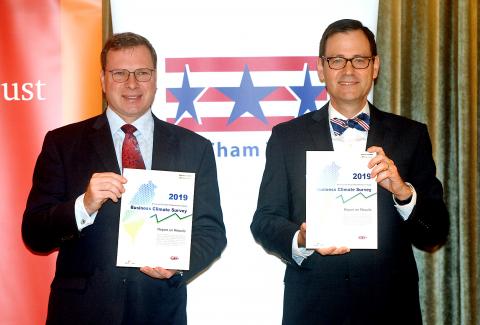US companies operating in Taiwan are significantly less confident than last year about Taiwan’s economic outlook this year, amid concerns over five key issues — trade disputes, Chinese pressure, cybersecurity, US trade policy and intellectual property rights infringement — the American Chamber of Commerce in Taipei (AmCham) said yesterday.
Based on input from 179 members, AmCham’s annual poll found that only 45.8 percent of respondents were upbeat about the outlook for this year, nearly a 10 percentage point drop from 55.5 percent last year.
However, 53.63 percent were optimistic about local growth over the next three years, slightly higher than last year’s 50.25 percent, AmCham said, adding that sound fundamentals would lend support to domestic growth and predicting that the volatility arising from the five key concerns could end in the next three years.

Photo: Lin Cheng-kung, Taipei Times
The US-China trade dispute is the biggest geopolitical threat to the local economy, followed by pressure from China over Taiwan and the US’ America first trade policy, AmCham chairman Leo Seewald told a news conference in Taipei.
Although the US and China on Dec. 3 announced a 90-day truce, 81 percent of respondents expect the dispute to last longer, Seewald said.
The survey, which was conducted from Nov. 12 to Dec. 21, included “pressure from China over Taiwan” as a geopolitical factor for the first time, with 79 percent of members expressing concern, but most companies said they would be willing to continue their operations in Taiwan as long as the environment remains stable, he said.
Power supply was once again citied as the main operational issue, with 86.59 percent voicing concern over energy sufficiency, up from 84 percent a year earlier, the survey showed.
With regards to the government’s “nuclear-free homeland by 2025” policy, member companies do not favor any kind of energy resources, but are worried how the policy would be implemented, AmCham said.
The passage of Referendum No. 16, which asked people if they agreed to abrogate Article 95-1 of the Electricity Act (電業法), has increased the uncertainty, it said.
“It does not matter how the lights go on, but it matters if they do not go on,” Seewald said.
AmCham advocates revisions to the Labor Standards Act (勞動基準法), as its members feel that current regulations are not flexible enough to meet their needs, with 55.31 percent saying labor issues are likely to be a key factor in their decisions on business expansion in Taiwan.
While more than a third of companies plan to increase employment this year, respondents are less satisfied with their companies’ ability to recruit talent, with the satisfaction rate dropping from 62 percent last year to 59 percent this year.
“It is not a significant drop, but may be a issue if it continues declining, and with young talent moving to Hong Kong and China seeking opportunities, we really need to find a way for them to stay in the nation,” Seewald said.

Intel Corp chief executive officer Lip-Bu Tan (陳立武) is expected to meet with Taiwanese suppliers next month in conjunction with the opening of the Computex Taipei trade show, supply chain sources said on Monday. The visit, the first for Tan to Taiwan since assuming his new post last month, would be aimed at enhancing Intel’s ties with suppliers in Taiwan as he attempts to help turn around the struggling US chipmaker, the sources said. Tan is to hold a banquet to celebrate Intel’s 40-year presence in Taiwan before Computex opens on May 20 and invite dozens of Taiwanese suppliers to exchange views

Application-specific integrated circuit designer Faraday Technology Corp (智原) yesterday said that although revenue this quarter would decline 30 percent from last quarter, it retained its full-year forecast of revenue growth of 100 percent. The company attributed the quarterly drop to a slowdown in customers’ production of chips using Faraday’s advanced packaging technology. The company is still confident about its revenue growth this year, given its strong “design-win” — or the projects it won to help customers design their chips, Faraday president Steve Wang (王國雍) told an online earnings conference. “The design-win this year is better than we expected. We believe we will win

Power supply and electronic components maker Delta Electronics Inc (台達電) yesterday said it plans to ship its new 1 megawatt charging systems for electric trucks and buses in the first half of next year at the earliest. The new charging piles, which deliver up to 1 megawatt of charging power, are designed for heavy-duty electric vehicles, and support a maximum current of 1,500 amperes and output of 1,250 volts, Delta said in a news release. “If everything goes smoothly, we could begin shipping those new charging systems as early as in the first half of next year,” a company official said. The new

Quanta Computer Inc (廣達) chairman Barry Lam (林百里) is expected to share his views about the artificial intelligence (AI) industry’s prospects during his speech at the company’s 37th anniversary ceremony, as AI servers have become a new growth engine for the equipment manufacturing service provider. Lam’s speech is much anticipated, as Quanta has risen as one of the world’s major AI server suppliers. The company reported a 30 percent year-on-year growth in consolidated revenue to NT$1.41 trillion (US$43.35 billion) last year, thanks to fast-growing demand for servers, especially those with AI capabilities. The company told investors in November last year that